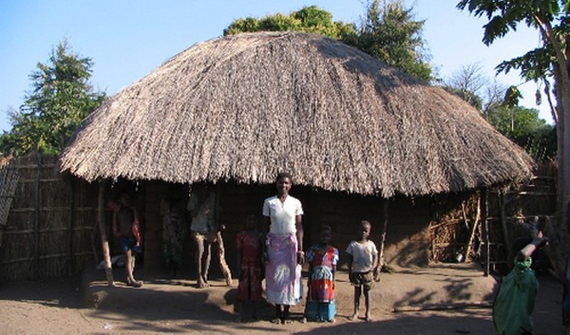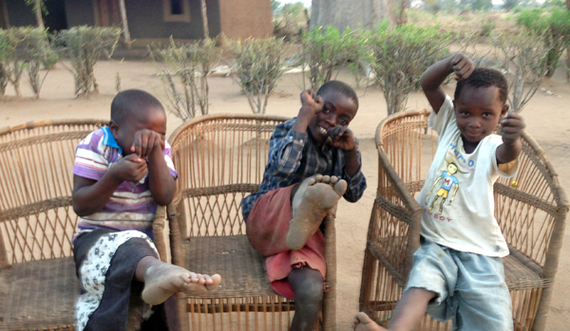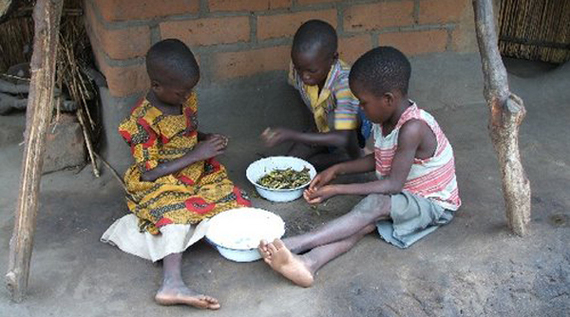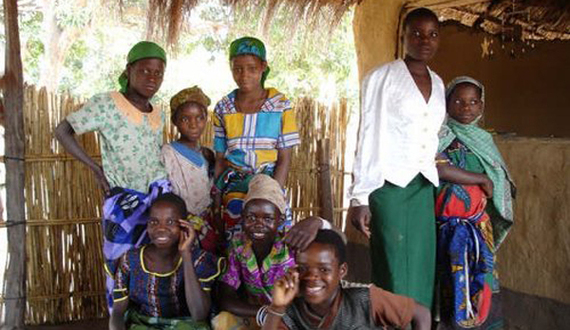In search of African authenticity, the author finds much to reflect on.
It is easy to be struck by paradox during a two-month trip through Africa, but the night I stayed in a small village near Liwonde Park in Malawi brought it all home.
Njobvu Cultural Lodge has been organized by local villagers to host travelers wanting a more authentic African village experience. You stay in a mud hut and sleep on a straw mat. You eat village food. You wash using a plastic cup with holes in the bottom that mimics a showerhead.
When I arrived, small children in rags -- well-worn secondhand clothing caked with dirt and dust -- vied to slip their small hands in mine. They became my second skin for the afternoon as I was shown around the village. The ones whose hands had lost out trailed closely, like a swarm of small birds, crowing our presence with bursts of laughter.
It was hot and quiet as I peered inside a family dwelling -- two rooms where two thin but tidy mattresses lay on the floor -- one for the children and one for the parents. To the side of the parents' room was a storage area for bags of mais, the Malawian staple eaten at every meal.
We sat on steps shaded by a large mango tree, chatting amiably as the afternoon heat dissolved into a sunset. My lady hosts translated for me, introducing me to villagers who wandered into the compound, filling me with stories, while the children poked at still green mangoes with long sticks, willing them to fall and smearing their mouths and faces with them ravenously.
As darkness fell we made our way back towards my hut. Parents were returning from the fields where they had been farming. Smoke mingled with cooking smells. The children ran home to find food and I was served mais, pumpkin leaves, and chicken. It was delicious.
The moon began to rise as we finished dinner, seated on straw mats near my room. Soon the children came back with older teenagers carrying musical instruments. This was a village without electricity. There were no computers or cell phones. Just people communicating the old fashioned way -- face to face -- the way that puts human beings first and reminds you that being a person and not a Twitter account is what matters most.
I felt like I was in an old Star Trek episode where the crew lands on a strange planet and discovers a parallel civilization. I had found the ultimate eco-village and possibly a kind of heaven.
Like a million others, I am a victim of the new malaise that has crept over everyone in my country who spends a strong percentage of their waking hours on a computer. I send and receive hundreds of emails every week but can count on my fingers the amount of live conversations I have in the same amount of time. Over-networked, yet starved for simpler forms of connection, I have learned to defend my isolation with even more frequent FB posts, because all the live people seem to have disappeared. Does it take an African village to find what we all are saying we want more of: human closeness and simpler and sustainable lives more in tune with natural cycles?
Dancing was a special talent in Njobvu. Once the young musicians set up their drums and started strumming the guitar, the whole village came out to strut their stuff under a bright full moon. Again, there was a Star Trek moment of feeling that I had landed in with another species--where everyone was wired to dance with amazing ability--down to the youngest inhabitant. The joy was fiery and infectious.
Sadly, the dancing ended abruptly when the spring for the drum bust. It was being held together with a tangle of wire and rubber strips. I was amazed it played at all.
I nodded off to a lullaby of crickets, frogs, wind, and the occasional off-the-mark rooster. I felt contented in a way I had not felt in a long time, as we all fell asleep in the same darkness under the same stars, no other lights in view.
I was sad to leave the next morning, but I continue to mull over the fundamental existential and sociological questions my village experience left me with:
1. How can we connect with each other when we are so barricaded by electronics and material "stuff"?
2. Is poverty the only way to level the field so that people can enjoy each other's humanity instead?
3. Why are we so focused on material accumulation when it clearly has little to do with joy and connection?
4. What are we wired for? How do we regain a capacity for the simple celebration of ourselves and others separate from the possessions that "indicate" our status?
When I was 19 -- over 35 years ago -- I spent the afternoon with a family in a Mali village. At the end of the afternoon, the grandmother of the clan, who lay on a bedframe on the floor of their mud home, sat up and beckoned me over. With a spidery hand, she pressed a coin into the palm of my hand, smiled and lay back down, satisfied by her generous gesture.
What kind of village does it take? One with heart.
Dominique Callimanopulos is the founder of Elevate Destinations, a company dedicated to transformative travel.
Experience the Njobvu Cultural Lodge for yourself with Elevate's Malawi Service and Safari.



